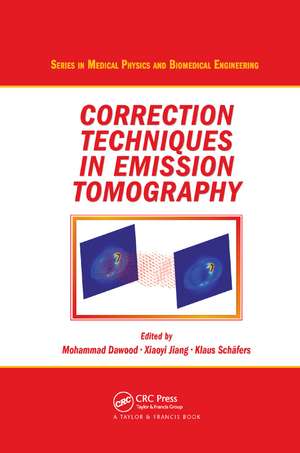Correction Techniques in Emission Tomography: Series in Medical Physics and Biomedical Engineering
Editat de Mohammad Dawood, Xiaoyi Jiang, Klaus Schäfersen Limba Engleză Paperback – 19 sep 2019
The book gives a comprehensive overview of correction techniques at different levels of the data processing workflow. It covers nuclear medicine imaging, hybrid emission tomography (PET-CT, SPECT-CT, PET-MRI, PET-ultrasound), and optical imaging (fluorescence molecular tomography). It illustrates basic principles as well as recent advances, such as model-based iterative algorithms and 4D methods. An important aspect of the book is on new and sophisticated motion correction techniques in PET imaging. These techniques enable high-resolution, high-quality images, leading to better imaging analysis and image-based diagnostics.
Reflecting state-of-the-art research, this volume explores the range of problems that occur in emission tomography. It looks at how the resulting images are affected and presents practical compensation methods to overcome the problems and improve the images.
Din seria Series in Medical Physics and Biomedical Engineering
-
 Preț: 362.42 lei
Preț: 362.42 lei - 5%
 Preț: 1304.46 lei
Preț: 1304.46 lei - 5%
 Preț: 346.24 lei
Preț: 346.24 lei - 15%
 Preț: 673.74 lei
Preț: 673.74 lei - 5%
 Preț: 339.69 lei
Preț: 339.69 lei -
 Preț: 356.64 lei
Preț: 356.64 lei -
 Preț: 359.37 lei
Preț: 359.37 lei -
 Preț: 364.30 lei
Preț: 364.30 lei -
 Preț: 366.36 lei
Preț: 366.36 lei - 9%
 Preț: 632.16 lei
Preț: 632.16 lei -
 Preț: 368.77 lei
Preț: 368.77 lei -
 Preț: 373.96 lei
Preț: 373.96 lei -
 Preț: 339.86 lei
Preț: 339.86 lei - 46%
 Preț: 352.95 lei
Preț: 352.95 lei - 23%
 Preț: 371.45 lei
Preț: 371.45 lei - 25%
 Preț: 1057.26 lei
Preț: 1057.26 lei - 5%
 Preț: 546.82 lei
Preț: 546.82 lei - 26%
 Preț: 1098.62 lei
Preț: 1098.62 lei - 49%
 Preț: 680.73 lei
Preț: 680.73 lei - 18%
 Preț: 1064.36 lei
Preț: 1064.36 lei - 22%
 Preț: 325.85 lei
Preț: 325.85 lei - 5%
 Preț: 914.71 lei
Preț: 914.71 lei - 23%
 Preț: 377.01 lei
Preț: 377.01 lei - 26%
 Preț: 848.15 lei
Preț: 848.15 lei - 15%
 Preț: 489.26 lei
Preț: 489.26 lei - 18%
 Preț: 1068.15 lei
Preț: 1068.15 lei - 28%
 Preț: 603.31 lei
Preț: 603.31 lei - 26%
 Preț: 1042.56 lei
Preț: 1042.56 lei - 25%
 Preț: 851.88 lei
Preț: 851.88 lei - 5%
 Preț: 910.15 lei
Preț: 910.15 lei - 15%
 Preț: 461.03 lei
Preț: 461.03 lei - 5%
 Preț: 915.27 lei
Preț: 915.27 lei - 18%
 Preț: 1438.46 lei
Preț: 1438.46 lei - 28%
 Preț: 1046.99 lei
Preț: 1046.99 lei - 5%
 Preț: 1038.35 lei
Preț: 1038.35 lei - 14%
 Preț: 312.45 lei
Preț: 312.45 lei - 5%
 Preț: 747.83 lei
Preț: 747.83 lei - 27%
 Preț: 1228.34 lei
Preț: 1228.34 lei - 18%
 Preț: 1059.45 lei
Preț: 1059.45 lei - 15%
 Preț: 682.83 lei
Preț: 682.83 lei - 25%
 Preț: 1195.93 lei
Preț: 1195.93 lei - 18%
 Preț: 887.88 lei
Preț: 887.88 lei
Preț: 489.26 lei
Preț vechi: 575.60 lei
-15% Nou
Puncte Express: 734
Preț estimativ în valută:
93.63€ • 97.39$ • 77.30£
93.63€ • 97.39$ • 77.30£
Carte tipărită la comandă
Livrare economică 14-28 aprilie
Preluare comenzi: 021 569.72.76
Specificații
ISBN-13: 9780367381448
ISBN-10: 0367381443
Pagini: 287
Dimensiuni: 156 x 234 x 18 mm
Greutate: 0.45 kg
Ediția:1
Editura: CRC Press
Colecția CRC Press
Seria Series in Medical Physics and Biomedical Engineering
ISBN-10: 0367381443
Pagini: 287
Dimensiuni: 156 x 234 x 18 mm
Greutate: 0.45 kg
Ediția:1
Editura: CRC Press
Colecția CRC Press
Seria Series in Medical Physics and Biomedical Engineering
Public țintă
Academic and Professional Practice & DevelopmentCuprins
Introduction. BACKGROUND: Biomedical Applications of Emission Tomography. PET Image Reconstruction. CORRECTIONS TECHNIQUES IN PET AND SPECT: Basics of PET and SPECT Imaging. Corrections for Physical Factors. Corrections for Scanner Related Factors. Image Processing Techniques in Emission Tomography. Motion Correction in Emission Tomography. Combined Correction and Reconstruction Methods. RECENT DEVELOPMENTS: Introduction into Hybrid Tomographic Imaging. MR-Based Attenuation Correction for PET/MR. Optical Imaging. Index.
Notă biografică
Mohammad Dawood is a researcher at the European Institute for Molecular Imaging. He earned a PhD in computer science from the University of Münster. His research interests include motion correction and tumor segmentation in medical imaging as well as biometrics and pattern analysis in image analysis.
Xiaoyi Jiang is a professor at the University of Münster and a scientist at the European Institute for Molecular Imaging. An IEEE senior member and an IAPR fellow, he earned a PhD in computer science from the University of Bern. His research areas include medical imaging analysis, pattern recognition, and computer vision.
Klaus Schäfers is head of the technology group at the European Institute for Molecular Imaging. He earned a PhD in medical physics from the University of Münster. His research interests include quantitative PET, motion detection and correction, high-resolution PET, multimodal molecular imaging techniques, and molecular imaging information in radiation therapy planning.
Xiaoyi Jiang is a professor at the University of Münster and a scientist at the European Institute for Molecular Imaging. An IEEE senior member and an IAPR fellow, he earned a PhD in computer science from the University of Bern. His research areas include medical imaging analysis, pattern recognition, and computer vision.
Klaus Schäfers is head of the technology group at the European Institute for Molecular Imaging. He earned a PhD in medical physics from the University of Münster. His research interests include quantitative PET, motion detection and correction, high-resolution PET, multimodal molecular imaging techniques, and molecular imaging information in radiation therapy planning.
Descriere
Written by an interdisciplinary team of medical doctors, computer scientists, physicists, engineers, and mathematicians, this volume presents various correction methods used in emission tomography to generate and enhance images. Topics include nuclear medicine imaging, hybrid emission tomography, and optical imaging, and an important aspect of the book is the exploration of new and sophisticated motion correction techniques in PET imaging. The contributors illustrate basic principles as well as recent advances, such as model-based iterative algorithms and 4D methods.
